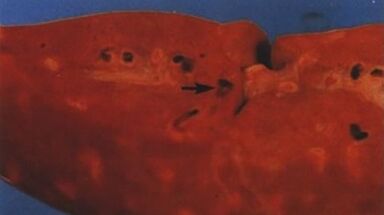Most commonly, various parasites affect the organs of the digestive tract - the stomach or intestines.But these organs aren't the only places where worms and other parasites live.They can also affect other parts of the body, including the liver.
Symptoms of infection are the same for all infections - side pain, itching, rash, jaundice of the skin and mucous membranes of organs, etc.Therefore, identifying a parasitic infection is not easy as its symptoms are similar to other liver diseases.
What parasites can live in the liver?

Most commonly, the following types of parasites colonize the liver:
- roundworms– These parasites pass from the intestines to the liver through the bile ducts.This disease is caused by ascariasis and is characterized by itchy skin and rash, discomfort in the liver area, and sometimes nausea and vomiting.
- Giardia- Another common parasite that affects the liver.People with giardiasis experience side pain, nausea and vomiting, yellowing of the skin, itching, and rash.
- Echinococcus– These organisms cause hydatid disease, the formation of cyst-like structures containing worms in the affected organs.The disease is accompanied by nausea and vomiting, yellowing of the skin, and as the disease progresses, the cysts begin to grow.
- Opisthorchis– This parasite is common in South Asian countries, so vaccination is recommended before traveling to these countries.Opisthorchis parasites live in the ducts of the liver and gallbladder and cause serious disease in these organs.
- Schistosoma– Also common in South Asian countries, they live mainly in aquatic environments, so you can become infected by swimming in ponds.Schistosomiasis causes the dangerous disease schistosomiasis, which often leads to cirrhosis of the liver and other diseases.
- Strongyloides– When ingested, they can lead to the development of strongyloidiasis, which is characterized by pain in the ribs, loss of appetite, yellowing of the skin and a bitter mouth.
- amoeba– In amoebiasis, the liver enlarges several times and forms an abscess.Infected people experience severe pain on one side, nausea, vomiting, and fever.
- Ciliates– When ingested, they can cause balanosis, a disease that is rarely diagnosed but can be very dangerous.With ballantiasis, there is pain in the affected area, which is exacerbated by palpation, bloody stools, and dry and yellow skin.
- liver fluke– A worm that affects the liver ducts and causes disruption of the function of the biliary system, including conditions such as cholangitis.The patient suffered from loss of appetite, weight loss, abdominal and rib pain, increased body temperature, rash, and skin itching.
route of infection

Worms can enter the body in the following ways:
- When eating unclean vegetables and fruits.
- When eating raw, undercooked meat.
- When drinking raw and unboiled water.
- After contact with an infected person.
- through the feces of infected animals.
- By dirty hands.
- When playing with domestic (or street) animals.
- After contact with the ground, the soil contains a large number of parasitic worms and their larvae.
- While swimming in still water.
The main way worms enter the body is through the mouth; some types penetrate the skin.
diagnosis
To identify a parasitic infection of the liver, you need to undergo several tests:
- General blood tests.
- Blood chemistry tests.
- Urinalysis.
- Bile analysis.
- Stool biochemical analysis.
- Blood tests for the presence of parasite antibodies—increased levels of antibodies indicate that the body is trying to fight the parasite.
- Scatological analysis of feces.
- An ultrasound of the abdominal cavity and liver will show the presence of cystic structures, abscesses, liver size, and other factors that indicate the presence of parasites.
treat
When getting rid of parasites, you need to remember one important rule:No self-medication allowed!Necessary treatment can only be prescribed by a doctor based on the type of parasite, extent of damage and other indications.Self-medication is fraught with serious complications and death.
Treatment of helminthiasis is aimed at:
- Eliminates the consequences of poisoning in the body.
- Remove parasites from the body.
- Improves enzyme activity in the liver and intestines.
- Prevent subsequent infections.
Regardless of the type of disease, infected people must follow dietary habits.Fatty, fried, spicy, high-salt foods, flour and sweets should be excluded from the diet.
You need to consume as much fiber as possible, which is found in cereals, lean meats, prepared and stewed vegetables and dairy products.Drink as much plain, clean, filtered or boiled water as possible.
The patient receives medication:

- anthelmintics– Kills and removes parasites from the body, preventing further infection.
- intestinal adsorbent– These products “collect” all the toxic substances that are poisoning the body and flush them out of the body.As a result, the entire gastrointestinal system is thoroughly cleansed, including the liver and its ducts.
- antidiarrheal medicine– Diarrhea is often associated with helminth infection, so antidiarrheal medication is needed to clear it up.
- anti-allergy medicine– When infected with parasites, various allergic reactions can occur, manifesting as skin rashes, burning sensations, and itching.To eliminate allergies, antihistamines are needed.
- Drugs to normalize liver function– They consolidate the effect of purifying the liver, promote the regeneration of damaged cells in the organ and normalize its functions.
- Vitamin and mineral complex - restores nutritional balance in the body.
Prevent infection
It is easy to become infected with parasites, so to prevent infection you need to remember the following important rules:
- Wash your hands as often as possible, especially after playing with animals, coming into contact with soil, using the toilet, and being outside.
- Wear only protective gloves when handling soil.
- Only eat fruits and vegetables that have been thoroughly washed.
- Do not drink raw water.
- Boil or fry the meat thoroughly.
- Do not swim in stagnant or unfamiliar water bodies.
- Before visiting another country, get vaccinated against parasites common in the area.






































